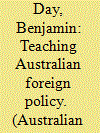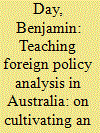| Srl | Item |
| 1 |
ID:
191824


|
|
|
|
|
| Summary/Abstract |
The centrepiece of the AUKUS defence pact agreed between Australia, the United Kingdom, and the United States in September 2021 was a commitment to help Australia acquire nuclear-powered submarines. This made redundant an earlier $90 billion deal Australia had entered into with France to deliver conventionally powered submarines. Australia’s decision to renege on the French deal, as well as the revelation that three of France’s key partners had negotiated AUKUS in secret, triggered a furious French diplomatic response. In this commentary, we explore the ramifications of this episode for future Australia-France relations. We begin by documenting the immediate diplomatic fallout of the AUKUS announcement and tracing how the dispute became personalised between Australian Prime Minister Scott Morrison and French President Emmanuel Macron. We then move to consider how the episode reveals the divergent approaches Australia and France are taking in response to China’s growing influence in the Indo-Pacific. Finally, we highlight three reasons why this episode represents a theoretically valuable case study for scholars interested in the roles of trust and leadership in global politics, given it features the breakdown of interpersonal trust between leaders of friendly states.
|
|
|
|
|
|
|
|
|
|
|
|
|
|
|
|
| 2 |
ID:
147640


|
|
|
|
|
| Summary/Abstract |
In the decade preceding the election of the Abbott Coalition Government in 2013, a so-called ‘golden consensus’ governed Australian aid policy. During this period Australia’s aid spending increased by over 80% in real terms. However, after winning government the 2013 Federal Election, the Abbott Government made a series of significant and unexpected aid policy decisions, cutting the aid budget three times in fifteen months and integrating AusAID, Australia’s aid agency, into the Department of Foreign Affairs and Trade. This article considers the future role of aid in Australia’s diplomacy primarily by engaging with a prior question: how was it possible for the golden consensus to be uprooted so easily? Conducting a post-mortem reveals that Australia’s development constituency bears some responsibility for the fragility of the consensus. This analysis also reveals the critical role the development constituency will play in determining the extent to which Australia is able to embrace the ‘beyond aid’ agenda. To meet this contemporary challenge, the development community must heed the lessons of the collapse of the golden consensus and, in particular, overcome its reticence to engage in broader foreign policy debates.
|
|
|
|
|
|
|
|
|
|
|
|
|
|
|
|
| 3 |
ID:
170404


|
|
|
| 4 |
ID:
170410


|
|
|
|
|
| Summary/Abstract |
The United States-centric nature of the Foreign Policy Analysis (FPA) subfield poses a range of pedagogical challenges, especially when the subject is taught outside North America. The preponderance of FPA literature written by US scholars and examining US cases can frustrate non-US students, who often wish to study decisions they consider more directly relevant to their own region and experience. I this piece, I reflect on how I have grappled with this tension in teaching a postgraduate FPA course at the Australian National University. I discuss my choice to prioritise cultivating an ‘FPA disposition’ among students and how, as a means of doing so, I chose to design a curriculum based on a semester-long case study examining the US decision to invade Iraq in 2003. While this pedagogical approach may initially seem contradictory to my long-term aim of contributing to the expansion of FPA beyond North America, it reflects my conviction that instilling an ‘FPA disposition’ in the next generation of graduate students is essential to growing and enriching the subfield in the long term.
|
|
|
|
|
|
|
|
|
|
|
|
|
|
|
|